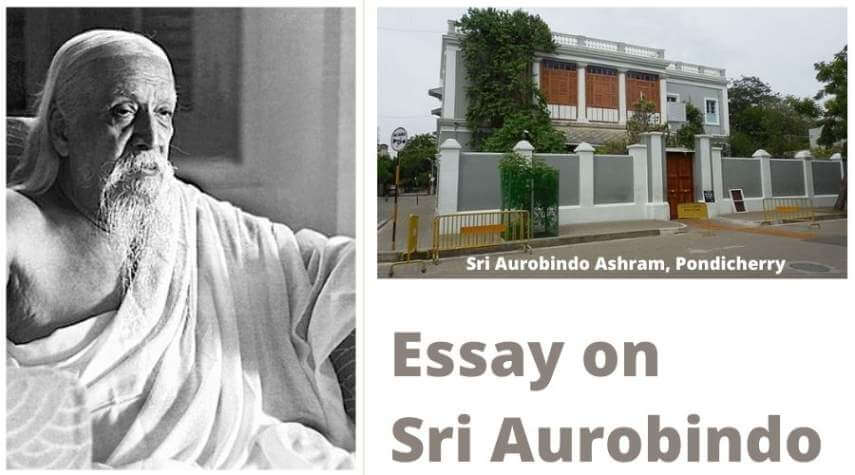If you are looking for an essay on Sri Aurobindo, then you are at the right place.
Let’s start the essay.
10 lines on Sri Aurobindo
- Sri Aurobindo was a great saint of India.
- He was born at Konnagar in Hooghly district on 15th August 1872.
- He was born to Krishnadhan Ghosh and Swarnalata Devi.
- He was sent to England for education at the age of seven only. He became an I.C.S. there. Then he returned to India.
- Aurobindo started his service career as a professor of English at Baroda College.
- Then he came back to Bengal and edited the ‘Bande Mataram‘ newspaper.
- Aurobindo then joined a revolutionary party. He was arrested as the police thought that he was associated with a bomb manufacturing factory.
- This is the turning point of his life. During his stay at the Alipore Central Jail, he had a vision. Then Aurobindo went to Pondicherry and started his spiritual life.
- Soon he became Sri Aurobindo. He wrote many books such as ‘Life Divine’, ‘Mother’ etc.
- He initiated Mira Richard, a French lady. Sri Aurobindo left his mortal frame on 5th November 1950.
Essay on Sri Aurobindo
Introduction:
Sri Aurobindo, born on August 15, 1872, was a philosopher, poet, yogi, and nationalist leader who made significant contributions to the fields of spirituality, philosophy, and social transformation.
He was a visionary who proposed a holistic approach to human evolution, emphasizing the importance of inner transformation for the progress of individuals and society.
Biography and Spiritual Journey:
Sri Aurobindo was born in Calcutta, India, during the time of British colonial rule. Educated in England, he became a prominent leader in the Indian nationalist movement. However, after experiencing a profound spiritual awakening, Sri Aurobindo shifted his focus from politics to spirituality.
He returned to India and embarked on a spiritual quest, integrating his profound spiritual experiences with his vast knowledge of philosophy and literature.
Sri Aurobindo’s spiritual journey led him to embrace the concept of integral yoga, which aimed to harmonize the divine and the human aspects of existence.
Teachings and Philosophy:
Sri Aurobindo’s philosophy was deeply rooted in the belief that human life is not just a material and physical existence but a journey towards spiritual evolution.
He proposed that through sincere self-discovery and inner transformation, individuals could transcend their limited ego-centric selves and awaken to their higher spiritual nature.
According to Sri Aurobindo, the purpose of life is to manifest the divine consciousness within each individual and to establish a higher spiritual consciousness on Earth. He envisioned a future where humanity would undergo a collective transformation, leading to a new era of peace, harmony, and unity.
Integral Yoga and Transformation:
At the core of Sri Aurobindo’s teachings was the practice of integral yoga. This holistic path aimed to integrate all aspects of an individual’s being – physical, vital, mental, psychic, and spiritual – into a harmonious whole.
Integral yoga emphasized the importance of self-awareness, self-discipline, and self-mastery.
It encouraged individuals to cultivate higher states of consciousness and tap into their inner potential. Through meditation, self-reflection, and surrender to the divine will, practitioners sought to realize their true nature and overcome the limitations of the ego.
Legacy and Impact:
Sri Aurobindo’s teachings continue to inspire and guide countless individuals on their spiritual journeys.
His philosophy has influenced various fields, including psychology, education, and literature. The Sri Aurobindo Ashram, founded by him in Pondicherry, India, serves as a centre for spiritual practice and study.
Sri Aurobindo’s vision of integral spiritual evolution resonates with the challenges faced by humanity today. His teachings offer a transformative path towards personal growth, social harmony, and the realization of humanity’s highest potential.
Conclusion:
Sri Aurobindo’s life and teachings have left an indelible mark on the spiritual and philosophical landscape.
His profound insights into the nature of human existence and his vision of integral spiritual evolution continue to inspire seekers of truth and contribute to the ongoing quest for personal and collective transformation.
Sri Aurobindo’s legacy serves as a reminder that by embracing our divine nature and striving for inner growth, we can contribute to the creation of a more enlightened and harmonious world.
- Essay on Sharks For Students & Children - April 8, 2024
- Essay on Cats for Students (+PDF) - November 4, 2023
- Essay on Carpenter|10 Lines on Carpenter - November 4, 2023

